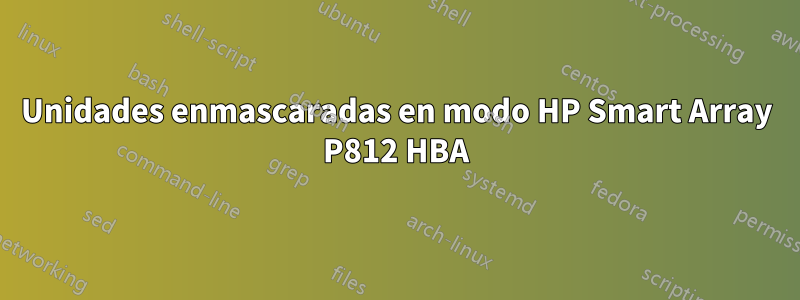
Tengo una tarjeta HP Smart Array P812 actualizada al modo HBA. El kernel parchó Linux para este módulo, Ubuntu 22. Todo estaba funcionando hace una semana, tuve transferencia de las unidades, incluso las usé para probar la configuración y copiar archivos, etc. Funcionó. Desde hace dos días simplemente ya no aparecía. Reinicié, sin cambios.
Se detuvo ssaclipara verificar el controlador y las unidades, parece que todo está bien, pero las unidades aún no aparecen lsblk.
$ ssacli ctrl all show detail
Smart Array P812 in Slot 4
Bus Interface: PCI
Slot: 4
Serial Number: PAGXQ0ARHZY04W
Cache Serial Number: PBCDF0CRH0D5U9
RAID 6 Status: Enabled
Controller Status: OK
Hardware Revision: C
Firmware Version: 3.66
Firmware Supports Online Firmware Activation: False
Cache Board Present: True
Cache Status: Not Configured
Total Cache Size: 1.0
Total Cache Memory Available: 0.9
Battery Backed Cache Size: 0.9
Cache Backup Power Source: Capacitors
Battery/Capacitor Count: 1
Battery/Capacitor Status: OK
Number of Ports: 6 (2 Internal / 4 External )
Driver Name: hpsa
Driver Version: 3.4.20
WWN Port: 50014380132301B0
HBA Mode Enabled: True
PCI Address (Domain:Bus:Device.Function): 0000:42:00.0
Port Max Phy Rate Limiting Supported: False
Sanitize Erase Supported: False
Primary Boot Volume: None
Secondary Boot Volume: None
SPDM Supports Get Slot Certificate Chain: no
SPDM Supports Get Controller Info : no
SPDM Supports Get Slot Info : no
SPDM Supports Set Import Certificate : no
SPDM Supports Set Invalidate Slot : no
Surface Scan Completion Supported: False
Persistent Event Log Policy Change Supported: False
$ cat /proc/scsi/scsi
Attached devices:
Host: scsi1 Channel: 00 Id: 00 Lun: 00
Vendor: HP Model: P812 Rev: 3.66
Type: RAID ANSI SCSI revision: 05
Host: scsi0 Channel: 00 Id: 00 Lun: 00
Vendor: SEAGATE Model: ST3146356SS Rev: HS0F
Type: Direct-Access ANSI SCSI revision: 05
Host: scsi0 Channel: 00 Id: 01 Lun: 00
Vendor: WD Model: WD3001FYYG-01SL3 Rev: VR07
Type: Direct-Access ANSI SCSI revision: 06
Host: scsi0 Channel: 00 Id: 02 Lun: 00
Vendor: WD Model: WD3001FYYG-01SL3 Rev: VR07
Type: Direct-Access ANSI SCSI revision: 06
Host: scsi0 Channel: 00 Id: 03 Lun: 00
Vendor: WD Model: WD3001FYYG-01SL3 Rev: VR07
Type: Direct-Access ANSI SCSI revision: 06
Host: scsi0 Channel: 00 Id: 04 Lun: 00
Vendor: SEAGATE Model: ST3146356SS Rev: HS0F
Type: Direct-Access ANSI SCSI revision: 05
Host: scsi0 Channel: 00 Id: 05 Lun: 00
Vendor: WD Model: WD3001FYYG-01SL3 Rev: VR07
Type: Direct-Access ANSI SCSI revision: 06
Host: scsi0 Channel: 00 Id: 06 Lun: 00
Vendor: WD Model: WD3001FYYG-01SL3 Rev: VR07
$ ssacli ctrl slot=4 pd all show detail
Smart Array P812 in Slot 4
HBA Drives
physicaldrive 4E:1:1
Port: 4E
Box: 1
Bay: 1
Status: OK
Drive Type: HBA Mode Drive
Interface Type: Solid State SATA
Size: 2 TB
Drive exposed to OS: False
Logical/Physical Block Size: 512/512
Firmware Revision: U1014A0
Serial Number: AA202300002100001831
WWID: 50014380042BA501
Model: ATA SSD 2TB
SATA NCQ Capable: True
SATA NCQ Enabled: True
SSD Smart Trip Wearout: Not Supported
PHY Count: 1
PHY Transfer Rate: 1.5Gbps
PHY Physical Link Rate: Unknown
PHY Maximum Link Rate: Unknown
Sanitize Erase Supported: False
Shingled Magnetic Recording Support: None
Si reviso dmesgsé que están allí, pero están enmascarados. Intenté volver a ejecutarlo, modprobe hbsapero no hubo cambios, sin mencionar que debería ejecutarse de todos modos en el arranque, reinicié varias veces después de hacer que todo esto funcionara hace unas semanas sin problemas.
$ dmesg | grep masked
[ 4.554241] hpsa 0000:42:00.0: scsi 1:0:1:0: masked Direct-Access ATA SSD 2TB PHYS DRV SSDSmartPathCap- En- Exp=0
[ 4.568580] hpsa 0000:42:00.0: scsi 1:0:2:0: masked Direct-Access ATA SSD 2TB PHYS DRV SSDSmartPathCap- En- Exp=0
[ 4.583223] hpsa 0000:42:00.0: scsi 1:0:3:0: masked Direct-Access ATA SSD 2TB PHYS DRV SSDSmartPathCap- En- Exp=0
[ 4.597927] hpsa 0000:42:00.0: scsi 1:0:4:0: masked Direct-Access ATA SSD 2TB PHYS DRV SSDSmartPathCap- En- Exp=0
[ 4.612871] hpsa 0000:42:00.0: scsi 1:0:5:0: masked Enclosure HP MSA70 enclosure SSDSmartPathCap- En- Exp=0
[ 4.628075] hpsa 0000:42:00.0: scsi 1:0:6:0: masked Enclosure HP P812 INT EXP enclosure SSDSmartPathCap- En- Exp=0
[ 4.643197] hpsa 0000:42:00.0: scsi 1:0:7:0: masked Enclosure PMCSIERA SRC 8x6G enclosure SSDSmartPathCap- En- Exp=0
ACTUALIZAR
Intenté borrar la configuración de las unidades, no me deja. Solo puedo obtener imágenes porque el controlador está en modo HBA, por lo que no parece que nada se borre:
$ ssacli ctrl slot=4 physicaldrive 4E:1:5 modify clearconfigdata
Error: This operation is not supported with the current configuration. Use the
"show" command on devices to show additional details about the
configuration.
Reason: Not supported
Respuesta1
Terminé cambiando las bases de código a la siguiente:
https://github.com/99dimitris/hpsahba
Parece que el código Git original para convertir la tarjeta al modo HBA, el controlador del kernel debe haber tenido problemas. Al cambiar a esa base de código anterior, volver a marcar mi controlador como HBA y luego reinstalar el nuevo controlador DKMS con este paquete funcionó. Después de reiniciar, todas mis unidades funcionaron bien.
Parecía ser un problema de controlador con el código base anterior.


